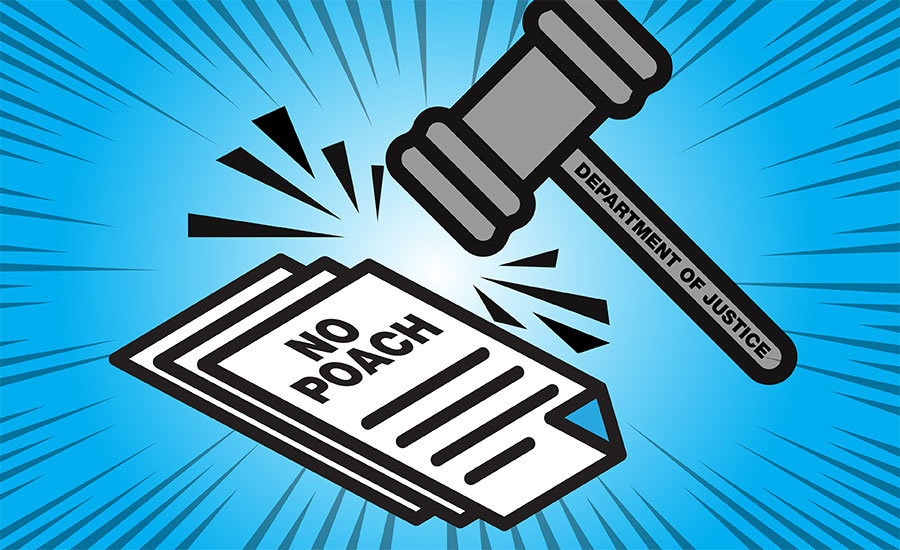The U.S. Justice Dept. is cracking down on a practice that some in industry say has been common for years—verbal or written agreements by firms not to poach each other’s employees, ranging from craftworkers to C-suite executives—with an eye toward keeping the labor market open and competitive.
Such agreements restrict worker mobility, lower wages and deprive employees of the chance to bargain for better jobs and opportunities, a department official told ENR.
DOJ has seen an uptick of complaints and has a number of active criminal investigations into “naked” no-poach and wage-fixing agreements, but cannot comment on their status. “Naked” agreements have no purpose other than to eliminate competition, say department officials who declined to be identified.
Friendly Competitors
Often longtime friendly competitors agree not to poach each other’s employees, says one official. Wage-fixing agreements set salary, wages, benefits or other compensation components either at specific levels or within a range. These kinds of agreements can affect workers across a variety of industries and jobs, says DOJ.
Last month, a Pennsylvania rail products maker agreed to pay $37 million to settle a class-action case in federal court stemming from a nearly a decade-long no-poach agreement it had with competitors, according to a Feb. 26 Pittsburgh Post-Gazette report.
The arrangement was found by DOJ during an acquisition review, in a case that the agency settled with the involved firms without fines or other legal actions. but which generated employee lawsuits seeking damages.
No industry is immune from the crackdown, but there is increased risk that the construction industry will be scrutinized. Poaching is common, and we see it with engineers and managers.
– Lauren Donahue, Partner, law firm K&L Gates
Such pacts have no purpose other than to eliminate competition in the same “irredeemable” manner as agreements to fix product prices or allocate customers and will be prosecuted criminally, officials say, although issues raised before October 2016 will be resolved as civil cases.
“Competitive labor markets require timely and effective antitrust enforcement. Inaction is not a price the public can afford,” Doha Mekki, counsel to the DOJ’s Antitrust Division, told Congress at an October 2019 hearing. “While the time and effort required to build a criminal case is intensive, corporate and individual liability is also necessary.”
The agency often learns of agreements through individual complaints but also during due diligence of corporate merger or acquisition deals.
When approving mergers, DOJ assesses whether a proposed transaction would allow the merged firm to reduce competition substantially in a labor market and use its enhanced bargaining power to depress workers’ wages and benefits, including salary, commissions and reimbursements.
DOJ says it has improved search and review technology to identify labor competition concerns in merger and non-merger probes.
Construction Focus
No industry is immune from the crackdown, but there is increased risk that the construction sector will be scrutinized, says Lauren Donahue, a partner at law firm K&L Gates LLP, citing DOJ’s recently established inner-agency strike force to root out bid rigging, price fixing and other forms of collusion.
“It’s a major shift,” says K&L Gates Managing Partner Michael Martinez, noting that until 2016 no-poach pacts were considered a civil violation. “We know the increased scrutiny is absolutely true, since we are representing individuals now,” he says.
“It’s common practice and we see it with … engineers and managers,” adds Donahue.
DOJ has given every indication it seeks a good case to prosecute, according to Donahue. While the agency has looked at agreements in non-U.S. markets, it is focused now more domestically. “We always advise clients if they are considering some type of arrangement, regardless of the rationale, to always consult with DOJ,” she says.
DOJ's fiscal 2021 budget request submitted to Congress last month includes a 13% increase in funding for the Antitrust Division. Overall, it is requesting a budget of $188.5 million for the next fiscal year, including added staff, says law firm Mprrison Foerster.
"This unprecedented increase in budget and staffing suggests that antitrust enforcement is, and will continue to be, a priority for the DOJ in the near future," says the firm.
DOJ held a public workshop last fall to increase awareness of no-poach practices, and notes last year’s House Judiciary antitrust subcommittee hearing on competition in the labor markets, at which agency officials noted active criminal probes into no-poach and wage fixing agreements as a top priority.
Prevalent Practice?
Jeff Robinson, president of Michigan consultant PAS, which surveys construction sector compensation trends, says he’s never seen any agreement in writing but knows they are used for middle managers and top execs. “Everyone understands this is illegal or certainly not ethical,” he says, adding that it’s more prevalent among firms that recruit locally.
Company principals often have relationships with other firms and don’t feel comfortable going after their employees, says Dan Pauletich, senior managing director of headhunter Specialty Consultants, Pittsburgh. The company recruits construction executives from contractors and specialty contractors, and while he is involved mainly with executive searches, Pauletich has searched for project managers as well. “We abide by our client’s wishes,” he says.
Carol Metzner, a Maryland-based executive recruiter, says she has received verbal instructions from clients not to recruit from certain companies or owners. “I always ask if there are any firms that are hands off, but I’ll stop asking that question now,” she says.





